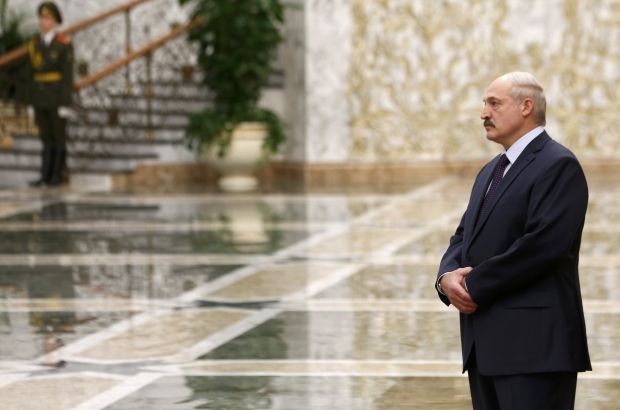
Is there a future for the Minsk-2 peace agreement?
The withdrawal of heavy weapons by all parties declared in the Minsk Agreement may be turned into a farce by the terrorist forces. However, in the meantime, Ukraine can get defensive weapons, and Russia in its turn may face new sanctions.
The package of measures to address the situation in the Donbas provides for the withdrawal of heavy weapons by both parties. And, despite the fact that according to preliminary data of the General Staff, in the east of Ukraine 58 Ukrainian troops have been killed and another 320 injured since the declaration of the latest ceasefire, Ukraine has began to withdraw its heavy weapons from the contact line in the Donbas on Thursday, February, 26. At the same time, the Ukrainian side demanded a complete ceasefire and the immediate implementation of the Minsk Agreement "by all signatories," otherwise the Ukrainian military equipment will be returned to its former positions.
In turn, the terrorist leaders also announced the start of the withdrawal of their heavy weapons, which was confirmed by the OSCE mission. In particular, a report was published on February, 28 in which a special monitoring mission of the OSCE reported the withdrawal of six columns of heavy weapons by the DNR and LNR terrorist organizations [the so-called Donetsk People’s Republic and Luhansk People’s Republic].
However, on March, 2, Andriy Lysenko, spokesman for the government’s ATO (Anti-Terrorist operation) headquarters said at a regular daily briefing that the militants were returning at night heavy weapons that they had let observers see being withdrawn the previous day. In turn, the Secretary for the National Security and Defense Council (NSDC) Oleksandr Turchynov, while visiting key areas at the contact line, where the ceasefire has been constantly violated since the Minsk-2 agreement, has said that given the continuous provocations from the Russian-terrorist groups, “our task is to strengthen the defense lines so that they will be able to withstand an attack from any enemy.”
A pause does not mean a truce
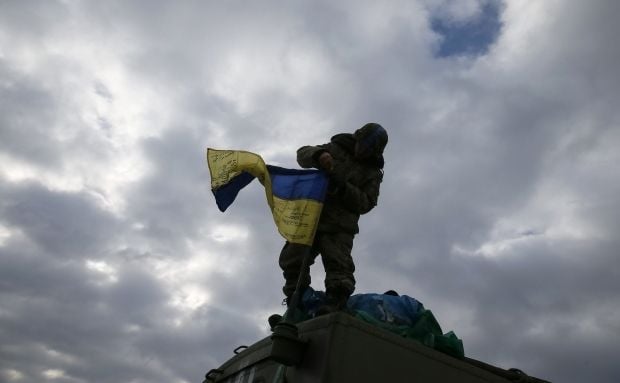
In this regard, the deputy head of the OSCE special monitoring mission to Ukraine Alexander Hug said that the coming days will be decisive for the Minsk Agreement. Given a UN report that noted the escalation of hostilities in recent weeks as well as the continued influx of heavy weapons and foreign fighters from Russia into DNR- and LNR-controlled areas of Donetsk and Luhansk regions, the fate of "Minsk-2" hangs in the balance.
If the status quo in eastern Ukraine can be considered a truce, it still is fragile and uncertain, experts say. “We see that the militants do not allow the mission to the sites of weapons withdrawal, there is a suspicion that they are returned to their positions,” says the head of the Penta Center for Applied Political Studies Volodymyr Fesenko.
According to the analyst, the future fulfillment of the Minsk Agreement will be achieved only if proper monitoring of the withdrawal of weapons and violations of the ceasefire is in place, and if the OSCE mission for carrying out such monitoring is broadened, in particular, in the areas near Avdiivka, Peski and around Donetsk airport.
According to Fesenko, the parties of the agreement “will try to make it so that they [the provisions of the agreement] are fulfilled, albeit partially and with delays.”
“In this case there is a chance that in the coming months, a truce, although a relative one, will be achieved,” he suggested.
Leading researcher of the Institute for System Analysis Andrey Piontkovsky believes a temporary and unstable ceasefire is the only positive result of Minsk-2 so far. “People aren’t dying, and that is of great importance,” he said.
“If this line separating the parties holds for a while, one should use this breathing space to strengthen the defensive line, because the Ukrainian army is fully capable of performing strategic defense, while causing serious damage to the enemy. The number of victims is already a very disturbing factor for the Kremlin leadership,” the Russian political analyst said.
Everything else, according to Piontkovsky, is just “empty words [promises] from Russia that will never be kept.”
“While in the document it stipulates the withdrawal of foreign troops, Russian officials say that there are no Russian troops there,” the expert says as an example.
In turn, the director of military programs for the Razumkov Center Nikolai Sungurovsky notes that a ceasefire is only possible when it comes to withdrawing armies. “In the Minsk-2 it’s only about the withdrawal of heavy artillery. Tanks, mortars, and large caliber artillery may actually remain in place. Therefore, under these conditions, the initiatives to deploy a peacekeeping force look like some kind of idealism, that is, there is nowhere to place this peacekeeping force,” Sungurovsky told UNIAN.
The expert is also skeptical about the recent agreement in Minsk because, in his opinion, it is worse than the first memorandum (Minsk-1). According to him, in September, at least, a buffer zone was negotiated. “The data coming from the area of the ATO indicate that there is not a withdrawal of heavy artillery but a redeployment of armed forces. And, basically, Minsk-2 provides for such an opportunity,” he said.
Still, Sungurovsky stressed that “there’s not much point in this withdrawal” if the locations where the weapons are being withdrawn to are not known.
The Kremlin's tactics of ‘forcing peace’
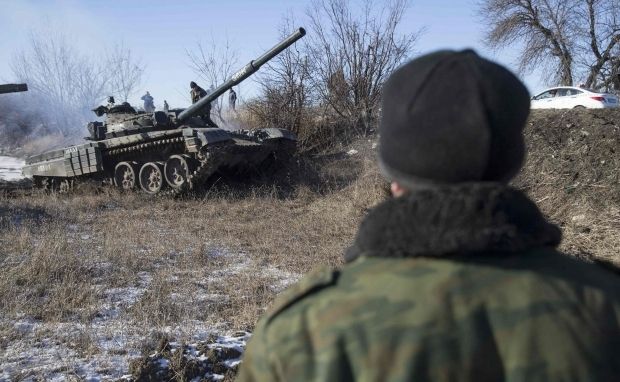
Sungurovsky also drew attention to the fact that Russian President Vladimir Putin has not given up on his goals. “This is not voiced out loud, of course, but the logic of action is that there is a concentration of forces in the area of Crimea,” he said.
This is where a substantial offensive may take place even before the end of the spring, according to Sungurovsky. “But not in order to force the corridor to Crimea, as many believe, because then the resources will be needed to hold it and deploy a large enough amount of troops there. The idea is to force the Ukrainian side and our Western colleagues once again to sit down at the negotiating table and to provide for creating such a corridor on an agreement basis. Then it will not have to be protected or maintained, as Ukraine itself will be doing it. I think this is what he expects. And in order to be able to implement this, some kind of offensive action in other sectors of the front is likely to be executed to disperse our forces,” the expert predicts.
Western experts also fear such developments. “Although the recent signs of a relative decline in the level of violence can be considered positive, I still believe that Russian-backed separatists will try to grab more of Ukrainian territories, of course, if they can. This is especially relevant for Mariupol,” said a British researcher at the Center for Baltic Studies at the University of Glasgow, Ammon Cheskin.
This opinion is shared by a fellow with the Center on the United States and Europe at the Brookings Institution, Riccardo Alcaro, “I am afraid that Russia, either by Putin's decision, or due to the separatists in eastern Ukraine that he supports, may be tempted to push the contact line in the Donbas [between the Ukrainian army and the militants and Russian troops] further west, likely to Mariupol, and possibly even further.”
An expert for the Harriman Institute at Columbia University Casey Michel agrees. He believes that the Minsk-2 agreement has given the parties an opportunity to “take a breath and regroup.” But, at the same time, the expert doubts that these agreements will be followed. “That’s because they have already been repeatedly violated, in particular, it in regard to Debaltseve,” he said.
According to him, the Moscow-backed separatists are likely to continue to try to further expand their control to other territories.
In turn, political analyst Fesenko noted that the destabilization about which the Western experts are concerned has already been taking place since mid-January.
However, in his opinion, “the sequence of actions will be as follows: [the militants] go on some offensive, then there is a pause, and then a new offensive. Therefore, the risks of new offensives by the separatists, unfortunately, remain likely. I think that it's only a matter of time.”
Putin's ultimatum
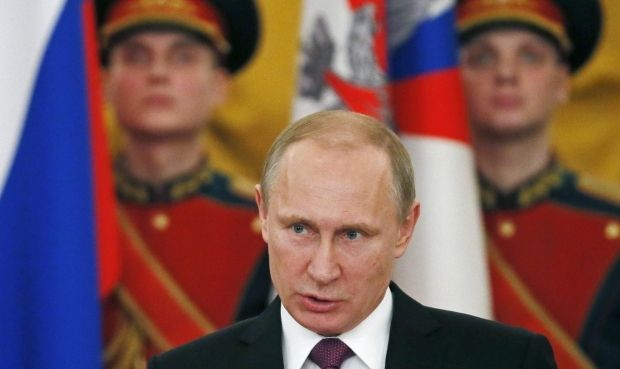
Further offensives that would negate any agreements reached in Minsk should also be expected because, for Russia, these agreements appear to be, in legal terms, “void.” This conclusion can be drawn, at least, from the statements of Russian President Vladimir Putin. “A couple of days ago, the second President of Ukraine Leonid Kuchma said that after the Minsk Agreement, Putin issued an ultimatum to Ukraine and the world community. And this is indeed the case. This ultimatum was [given in] the Russian president’s interview with Vladimir Solovyov, a journalist for Russia TV network VGTRK, in which he [Putin] said that the Minsk agreements are binding for Ukraine and listed the things which, in his interpretation, Ukraine must do,” said Piontkovsky, the Russian political analyst. “These are the amendments to the [Ukrainian] constitution, the federalization, ‘Finlandization’, or ‘Krymnashization’ [a neologism deriving from a slogan ‘Krym nash’ – ‘Crimea is ours’, meaning, in this context, forming broad public support for Russia’s foreign policy, including the annexation of Ukraine’s Crimea] and complete dependence on the demands and on the will of the leaders of the terrorist groups.”
Roughly speaking, until Ukraine fulfills the agreement as per Putin’s interpretation, he will keep the terrorists “on a leash.” If Ukraine balks, according to the self-proclaimed leaders of the DNR and LNR, they will resort to “emergency measures”, including the possibility of a full-scale Russian-Ukrainian war. “These intentions are confirmed by the continuing transfer of military personnel and weapons to the insurgent-controlled territory in the Donbas. “Therefore, the threat of terrorists seizing Mariupol is real, operational plans have been developed, and at any time that Putin doesn’t like something in the position of the Ukrainian authorities, he can begin to implement it,” explains the expert.
“Putin continues to play his game, on the one hand, totally controlling the situation in the occupied territories, on the other hand - talking about his ‘peace initiatives’ as a mediator in a ‘civil war.’”
Risks and repercussions of supplies of weapons to Ukraine
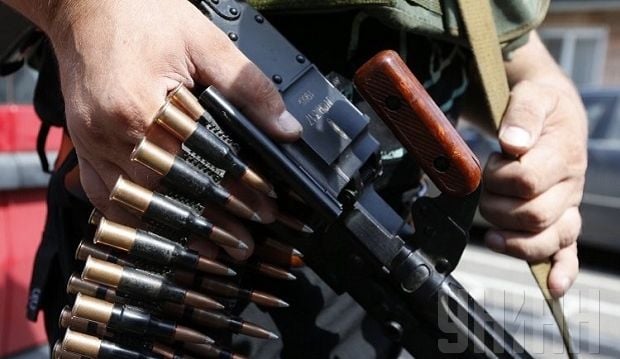
Piontkovsky is positive that Ukraine should stop playing the game imposed by Putin. Stop pretending that there is territorial integrity in the Donbas and that Ukraine is responsible for the area. “This territory is occupied, and it has to be said that it’s a territory temporarily occupied by an aggressor, just like Crimea. And the occupant authorities bear full economic, political and humanitarian responsibility for everything that happens there,” he said.
In his opinion, this would not mean that Ukraine is giving up on these areas - it will certainly regain them, “but doing it now with military means is impossible, due to greater advantage of the Russian army.”
At the same time, he said, Ukraine can maintain an active strategic defense along the contact line. And sooner or later, due to its own efforts and the efforts of its allies, it will regain these territories.
However, obtaining modern defensive weapons would help Ukraine win or at least not lose in this geopolitical game. Still, Western experts believe that the supply of weapons to our country is potentially very dangerous. In particular, a visiting fellow at the Center on the United States and Europe at the Brookings Institution, Riccardo Alcaro, believes that supplies of weapons to Ukraine will lead to an escalation of the conflict in the Donbas. The threat [from arms supplies] is greater than the probability that it will stop Putin, he says. “So far, Putin has been repeatedly demonstrating his determination not to let the separatists lose,” the expert says, adding that Ukraine’s obtaining weapons will only redouble the aggressive efforts of the Kremlin, rather than stop Putin.
However, Sungurovsky says that Ukraine should think about ways to reduce the number of victims of the war, and this is why the country needs defensive weapons from the West - as many as possible. “Today, the West is afraid to provoke Putin with supplies of weapons to Ukraine, but Putin can’t be provoked with anything. If he needs some kind of provocation, he will arrange it himself,” the expert said.
According to Sungurovsky, in discussions regarding the supply of weapons to Ukraine, the other obvious thing gets lost out of sight. “Any defensive tool is a means to suppress the firepower of advancing troops. The more we suppress these forces, the fewer casualties are on our side – civilians in particular.”
“Ukraine has to make a statement that it is not going to liberate Russian-occupied areas in the Donbas by the use of force; it carries on with the line of strategic defense. Such position of strategic defense will be very helpful in the continuing discussion that goes on in the United States,” said Russian political analyst Piontkovsky. “And when Ukraine obtains these radars, drones, Javelins, the price of Putin’s further aggression in Ukraine will rise sharply. If he wants to break through this line of defense and move on, the price, especially terms of lives of his soldiers, will be much higher and will be unacceptable for Russian society,” the expert said.
According to Piontkovsky, despite all the sociological studies stating that nearly 84% of Russians support Putin, the idea of a full-scale war, even according to official surveys, is not popular in Russia.
Author: Konstantin Goncharov

